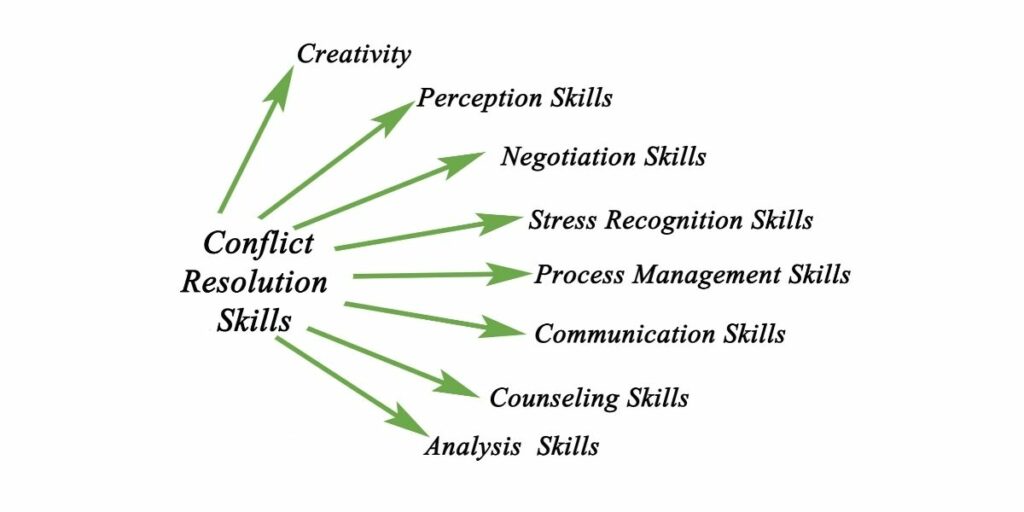Disclaimer: We sometimes use affiliate links in our content. For more information, visit our Disclaimer Page.
Conflict is a normal and even necessary part of life. How we manage conflict can make all the difference. When conflict is managed effectively, both individuals and organizations can benefit.
However, when conflict is mishandled, it can lead to decreased productivity, hostile work environments, and even legal action. In this article, we will discuss conflict management skills, what they are, and how they can be used to resolve conflict positively.
What is a Conflict management skill?
Conflict management skill is the ability to identify, assess, and manage conflicts constructively. It includes understanding your reactions and those of others, communicating effectively, and resolving differences peacefully.
Conflict management skills are important for individuals, families, and organizations. They can help prevent disputes from escalating and can improve relationships.
There are many different conflict management styles, but not all of them will work in every situation. Therefore, you must be aware of your options and adapt your approach as needed.
Why are Conflict management skills important?
Conflict management skills are essential because they help individuals and groups constructively resolve disagreements. In addition, managing conflict effectively can lead to positive outcomes such as increased productivity, improved relationships, and greater satisfaction.
However, when conflict is mishandled, it can have negative consequences such as decreased productivity, negative work environments, and even legal action.
Related: Importance of Relationships Within the Workplace
Some Effects of conflict in the workplace

If you are experiencing conflict in the workplace, it is crucial to seek professional help. A trained conflict resolution specialist can help you identify the root of the problem and find the best resolution for everyone involved.
Conflict in the workplace can have several negative effects, such as:
• Decreased productivity
Decreased productivity is one of workplace conflict’s most common effects. When employees are embroiled in conflict, they are often not working to their fullest potential. This can lead to decreased productivity and a decline in the quality of work.
• Negative work environment
Another common effect of conflict is a hostile work environment. Conflict can create an atmosphere of mistrust and suspicion. This can make it difficult for employees to work together and can lead to a decline in morale.
• Legal action
Conflict can also lead to legal action. If the conflict escalates, it may result in lawsuits or other legal action against the company or individuals involved.
• Relationship conflict
Conflict can also cause relationship problems both inside and outside of work. For example, employees constantly fighting with each other may have difficulty maintaining personal relationships. This can lead to conflict at home, which can then spill over into work.
• Job satisfaction conflict
Job satisfaction is another area that can be affected by conflict. Employees who are constantly fighting with each other or who have a negative work environment may start to look for new jobs. This turnover can be costly for companies and lead to a moral decline.
• Communication problems
Finally, conflict can cause communication problems. When employees are not getting along, they may start to avoid each other or refuse to communicate. This can make it challenging to get work done and can lead to further conflict down the road.
6 Conflict Management Skills You Should Know

Conflict management skills are essential for both individuals and organizations. By understanding and using these skills, you can resolve conflict positively, leading to better outcomes for all involved.
By understanding and using these conflict management skills, you can resolve conflict positively, leading to better outcomes for all involved.
Here are six conflict management skills that can help:
1. Listen to the other person’s perspective
Active listening is a skill that salespeople commonly use to connect with customers during a pitch. Still, it can be helpful for anyone who wants to improve their communication skills. Active listening means being attentive to what the other person has to say and responding in a way that shows that you understand.
The most important thing you can do when practicing active listening is to have an open mind and listen carefully to the other person’s phrasing. If you are confused about a point, ask questions and focus on identifying the other person’s goals.
Active listening can help you resolve conflicts and communicate more effectively.
2. Emotional Intelligence
Emotional intelligence is widely recognized as a critical factor in the successful conflict management process. Emotional intelligence describes the ability to perceive and understand other peoples’ emotions and your own.
This skill is essential when managing conflict because it prevents the situation from escalating. In addition, if you can effectively interpret your opposition’s emotions, it’ll be easier to communicate without provoking them.
Recognizing and curtailing the conflict’s confusion, anger, and frustration leaves space for everyone involved to think creatively and logically about a solution. In other words, emotional intelligence is key to keeping a level head during the conflict, which is essential for resolving the issue at hand.
3. Be patient
Patience is vital when attempting to resolve a conflict. However, with 22,000 monthly internet searches for “conflict resolution,” it’s clear that people find the process difficult.
Often, people don’t want to budge on their stance because they don’t want to be wrong. So if you’re trying to resolve a conflict with someone like this, you’ll need to remain patient.
It’s important to remember that the problem might not be solved immediately, even if the solution is clear. You’ll want to take the time to listen to every participant and value every argument equally. Even if there’s an obvious answer, rushing to a resolution can make people feel like they weren’t involved in the decision-making process.
Having strong conflict resolution skills is essential to maintaining healthy relationships.
4. Aiming for impartiality
When conflict arises, it’s essential to try to stay impartial. This can be difficult to do when the conflict is with someone close to you, but it’s important to remember that the issue is not personal.
It’s also important to remember that the conflict may not always stay focused on the original issue. Instead, the conflict can often be an opportunity to air previous grievances between the parties over time.
In this situation, it’s best to separate the conflict from the people involved. Don’t focus on the people and their characteristics. Instead, look at the problem and center your energy on finding a solution.
While it might be important to work through those past issues at some point, don’t deprioritize the situation to solve the older ones. Remember Eisenhower’s Urgent vs. Important Principle. You can address those historical issues at some point down the road, but for now, try to stay focused on resolving the current conflict.
5. Be positive
Positivity is essential in conflict resolution. All parties involved must agree to the solution for it to be effective. Furthermore, a healthy compromise should not leave any participants resentful or angry.
A positive attitude helps to keep the conversation moving forward and can also help other participants feel more at ease. It is important to remember that conflicts are full of roadblocks, and you’ll need to be willing to overcome them if you want to come to a resolution.
With this in mind, positivity is vital to managing a conflict successfully.
6. Communicate openly and honestly
Avoid conflict at the workplace. Whether it’s a personality clash or a disagreement over a project, sooner or later, most people will find themselves in some sort of dispute with a coworker.
And while it’s often possible to resolve these conflicts through discussion and compromise, the relationships between the parties involved don’t always go back to normal when the problem is resolved. This is why it’s essential to nurture these relationships after a solution is found to prevent future issues from arising.
One of the best ways to do this is by creating an open line of communication between the parties. This allows both sides to check in on one another and ensure that the agreement’s terms are being upheld.
If new challenges arise, a precedent of open communication should make it easier for participants to address the roadblock without risking any progress they’ve previously made.
In today’s workplace, where teamwork and collaboration are vital, maintaining positive relationships with coworkers is more important than ever. So if you find yourself in the midst of a conflict, remember to take steps to nurture your relationship afterward. It could make all the difference in your future success.
Related: Examples of Interpersonal Skills
Improve your conflict management skills

If you want to improve your conflict management skills, there are a few things you can do:
• Join a workshop
A conflict management workshop is one of the most valuable things. It allowed you to learn about different conflict management styles and how to apply them in different situations.
It also helps to understand that conflict management aims to resolve conflicts fairly and respectfully to all parties involved. These workshops also include a role-playing exercise, which is extremely helpful in improving skills in conflict resolution.
Overall, It would be highly recommended to take a conflict management workshop for anyone who wants to improve their ability to resolve conflicts.
• Talk to people who are good at conflict management
Talk to people who are good at conflict management. This helps understand how they handle conflict and what techniques they use. In general, they tend to be more assertive and proactive in their approach. They are also better at listening and can effectively communicate their needs and boundaries.
Furthermore, they can see both sides of the issue and remain open to finding a mutually beneficial resolution. By gaining insights from those skilled in conflict management, you can learn how to handle disagreements in your own life better.
• Collaborate with someone
Collaborating with someone on a project can be a great way to resolve conflict. This is because you can practice your conflict management skills in a real-world setting. However, when you are working on a project, you inevitably encounter disagreements.
However, working together can resolve these conflicts quickly and efficiently. This will not only help you to improve your conflict management skills, but it will also help you to build a strong relationship with the person you are collaborating with.
• Ask for feedback
After resolving a conflict, asking for feedback from others on how you handled the situation can be helpful. This can help you to improve your conflict management skills. Asking for feedback can also help to build trust and communication within a team.
If people feel like they can openly give feedback, identifying and resolving conflicts is easier before they become more significant issues.
Whether seeking feedback from a supervisor or a coworker, asking for honest feedback is an integral part of being a successful team member.
• Practice active listening
Active listening is a skill that can be learned and practiced. It involves listening to the other person with full attention and without interruption. This can help you to understand the conflict better and find a resolution.
Practice active listening by giving the person your full attention, making eye contact, and withholding judgment. Then, repeat what you heard to ensure understanding— practice Listening in your everyday interactions, at work and at home.
You may be surprised at how better you can communicate and resolve conflicts when you take the time to listen.
• Read about conflict management
Plenty of resources are available if you’re interested in learning more about conflict management. Books and articles on the subject can provide valuable insights into effective conflict resolution.
Many of these resources also offer tips on how to avoid conflict in the first place. By reading about conflict management, you can better understand how to deal with disagreements constructively and productively.
Related: Examples of Respect in the Workplace
What is Conflict Resolution Skill?

Conflict resolution skill is the ability to identify and manage conflict in a constructive way. It involves understanding different perspectives, communicating effectively, and using problem-solving techniques to resolve.
Anyone can develop conflict resolution skills with practice. It’s important to stay calm and collected during disagreements and to think strategically about how to resolve the conflict. Some key strategies for resolving conflicts include listening carefully, considering all sides of the issue, being flexible, and maintaining a positive attitude.
9 Best Conflict Resolution Skills
Conflict resolution skills are essential for anyone who wants to be successful in the workplace. With the ability to resolve conflict, you will be able to create a more positive and productive work environment.
There are many conflict resolution skills that you can learn, but here are some of the most important:
1. Communicate openly and honestly
Communication is critical in conflict resolution. You must communicate openly and honestly with the other person to resolve the conflict. This means you should avoid talking behind someone’s back and instead speak to them directly. It is also essential to avoid taking things personally during a conflict. This can be difficult, but it is essential to remember that the conflict is not about you.
By communicating openly and honestly, you can resolve conflict positively. This can help to create a more productive and positive work environment. Never talk behind someone’s back.
2. Be willing to compromise
Another important conflict resolution skill is the ability to compromise. This means that you should be willing to give and take to resolve. It is important to remember that conflict resolution is not about winning or losing.
Instead, it is about finding a solution that works for both parties involved. By being willing to compromise, you can resolve conflict constructively.
Compromise can be difficult, but it is a critical conflict resolution skill. By being willing to give and take, you can find a resolution that works for everyone involved.
3. Never talk behind someone’s back
It’s easy to fall into the trap of talking about others behind their back, especially regarding the conflict.
However, it’s important to remember that what happens between you and the other party should stay between you and them unless it’s necessary to divulge the details of your conflict.
It is unprofessional to talk about others behind their back, but it can also worsen the situation. If you feel you need to confide in someone about the conflict, be sure to choose someone who is in a higher position than you and can offer impartial advice.
By following this rule, you can avoid making the situation worse and maintain a professional relationship with the other party.
4. Nothing should be taken personally
Nothing should be taken personally. For example, a conflict with a customer or team member is typically not a conflict with you, personally. Instead, it usually involves policies that you as an employee must adhere to or even unvoiced expectations other people have for your role or profession.
Thus, a conflict that emerges is rarely ever an attack on you as an individual. If we can learn to separate ourselves from the conflict, it will be a lot easier to accept compromise or a better collaborative solution for all parties involved at the end of the day.
When we take things personally, we get defensive or upset or refuse to budge on an argument because we cling to our viewpoint as a part of ourselves.
5. Keep your tone calm
It can be challenging to keep a level head when confronted with someone with a different opinion than your own, especially if the situation is heated.
However, it is important to remember that remaining level-headed is the best way to come to a resolution that works for both parties. If you allow yourself to get too emotional, you will not be able to reason about the situation and find an agreeable solution for everyone.
One way to avoid this is to wait until you have let out your emotions before you meet with the other party to discuss the conflict. This way, you can enter the conversation calmly and be ready to consider all perspectives.
6. Apologize and forgive when necessary.
Apologizing is hard. You must humble yourself and admit that you were wrong, even if it’s just a little bit. It’s even harder when you know you were right all along. But sometimes, in the interest of maintaining a healthy relationship with the other person. It is necessary to let your pride go and apologize anyways.
If the other person did something to hurt you, try to forgive them. This will help reduce tension and allow you both to move on. And if you’re the one who needs to apologize, don’t let pride stand in your way. A sincere apology can go a long way towards repairing a damaged relationship.
7. Avoid escalation by remaining calm and constructive
It is also vital to avoid escalation by remaining calm and constructive during a conflict. This means that you should avoid raised voices and instead try to stay calm. It is also important to be constructive when communicating with the other person. This means you should avoid personal attacks and focus on the issue.
Escalation can be a significant problem during a conflict. However, you can avoid escalation and find a resolution by remaining calm and constructive.
8. Seek professional help if needed
If you have difficulty resolving conflict on your own, you may need professional help. Many professionals specialize in conflict resolution and can help you resolve the dispute positively. This is a critical conflict resolution skill because it shows that you are willing to seek help when needed.
Sometimes conflict can be difficult to resolve on your own. If you are having difficulty, seek professional help. Many professionals specialize in conflict resolution and can help you find a positive solution.
9. Use conflict resolution strategies such as mediation or arbitration
There are many conflict resolution strategies that you can use to resolve conflict. Some of these strategies include mediation and arbitration.
Mediation is a process where both parties in the conflict meet with a neutral third party to discuss the conflict and try to resolve it. Arbitration is similar to mediation, but the arbitrator decides how the conflict should be resolved.
An interviewer’s guide to conflict management

When interviewing candidates for a position, it is essential to ask questions that will help determine if the candidate has conflict management skills.
Here are some examples of questions that you can ask:
- Can you give me an example of a time when you had to resolve a conflict?
- What conflict resolution strategies do you typically use?
- Can you tell me about a time when you dealt with a demanding customer or team member?
- How did you handle the situation?
- Can you think of a time when you made a mistake at work? How did you handle the situation? Did you take responsibility for your actions?
Related: Examples of Organizational Skills
Conclusion
Conflict management skills are essential for any individual, team, or organization. By understanding and using these skills effectively, you can resolve conflict positively and create a productive working environment.
We hope this article has given you a better understanding of conflict management skills and how they can be used in your own life.
What is your experience with conflict? How have you resolved conflicts in the past? Tell us about it in the comments section below.
FAQ
What is conflict management?
Conflict management is the process of resolving conflict positively. This can be done through mediation, arbitration, or other conflict resolution strategies.
What are some examples of conflict management skills?
Some examples of conflict management skills include remaining calm and constructive during a conflict, seeking professional help if needed, and using mediation or arbitration to resolve conflict.
Why is it important to have conflict management skills?
It is essential to have conflict management skills because conflict is a normal and even necessary part of life. However, how we manage conflict can make all the difference. When conflict is managed effectively, both individuals and organizations can benefit. However, when conflict is mishandled, it can lead to decreased productivity, negative work environments, and even legal action.
How can I improve my conflict management skills?
Some ways to improve your conflict management skills include taking a course, reading books on the subject, and practicing mediation or arbitration.
How do you manage conflict in the workplace examples?
There are a few different ways to manage workplace conflict. One way is to try and resolve the conflict as soon as possible by talking to the other person involved.
Another way is to meet with all the people involved in the conflict to devise a solution.
Finally, if those methods don’t work, you can always go to your supervisor or HR.
How do you train for conflict resolution?
It depends on the specific situation and context in which you seek conflict resolution training. However, some methods for training in conflict resolution may include workshops, role-playing exercises, and simulations.
These can help prepare individuals for dealing with real-world conflict by providing them with opportunities to practice and troubleshoot various scenarios.
Additionally, it may be helpful to seek mentorship or professional counseling to gain insights into how other people have resolved conflicts successfully (or not).
What makes good conflict management?
Many different factors can contribute to effective conflict management. One of the most important is effective communication. This means being able to listen to and understand the other person’s perspective, as well as clearly articulating your views.
It is also essential to be able to manage your emotions during a conflict situation so that you can remain calm and constructive. Another critical factor is being able to compromise and reach an acceptable agreement for both parties.
Lastly, it’s helpful to have a plan for managing future conflicts so that you can avoid them or resolve them more effectively.
How do you learn conflict resolution skills?
Some people may learn conflict resolution skills in a formal setting, such as a class or workshop. Others may learn them informally by observing how their parents or other role models dealt with conflict. There are also many books and articles on the subject.
The most important thing is to be willing to try new things and to keep learning. Conflict resolution is an evolving process, and there is no one right way to do it. What works for one person might not work for someone else. Be open to new ideas, and be prepared to experiment until you find what works best for you.
Why is it important to learn conflict resolution skills?
Conflict resolution skills are vital because they can help you better manage difficult situations and relationships. When you know how to resolve conflicts effectively, you’re less likely to let them get out of hand or cause lasting damage. You’ll also be better equipped to navigate disagreements in a way that works for everyone involved.
You can learn all sorts of conflict resolution skills, but some of the most important ones include communication, problem-solving, and mediation. These skills can help you defuse tense situations, find common ground with others, and build strong relationships.
And while it’s not always easy to resolve conflicts, it’s worth the effort — for yourself and those around you.





